

Fashion Journalism. Newspaper Journalism. Science Writer. Journalism Courses. Journalist: job description. Magazine journalist: Job description. Magazine journalist: job description. What does a magazine journalist do?
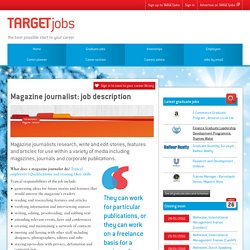
Typical employers | Qualifications and training | Key skills. Magazine journalist job information. Page Content Magazine journalist Hours30-40 per weekStarting salary£18,000 + per year.
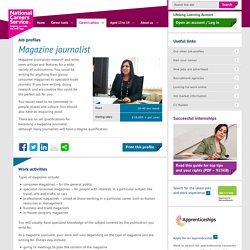
Press sub-editor: Job description. Press sub-editors, or subs, check the written text of newspapers, magazines or websites before it is published.

They are responsible for ensuring the correct grammar, spelling, house style and tone of the published work. Subs make sure that the copy is factually correct and that it suits the target market. They also lay out the story on the page, write headings and may be involved with overall page design. Press sub-editor: job description. What does a sub-editor job do?
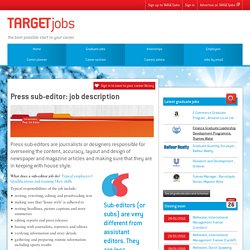
Typical employers | Qualifications and training | Key skills. MediaPublishingJournalism journalism. How I started my own business – EmTalks. This week, Broadcast Journalism grad Em Sheldon talks about how she turned her blog into a business and gives some great tips for students who want to get into blogging.

About my business: I started Emtalks in 2012 as a way to get onto my University course, never in my wildest dreams did I expect for it to turn into my full time job. I called the admissions tutor at the University of Leeds two days before UCAS application and asked what I can do to get onto the course. University of Leeds Careers Centre Blog. Want to get in to the Media industry?

Terrified by the competitive nature of it? Take a look at these tips by Careers Consultant Venita Girvan and perhaps you’ll get ahead of the game! The Media sector is a large part of the UK and it is a popular form of communication that many of us rely on or use in our daily lives. The ways in which things are communicated through the media industry vary from broadcast to print: Broadcast Media – This is information that is communicated electronically, for example, through television, film and radio. So%20you%20want%20to%20be%20a%20journalist%20careers%20leaflet%20 %20Jan%2014. Careers brochure 2010 11. CIoJ-Student-Information. Journalism Careers. Journo Resources - Journo Resources. Journalism - CareersWiki. Sector Overview Liz Batterham is the relevant Careers Adviser for this occupational area.
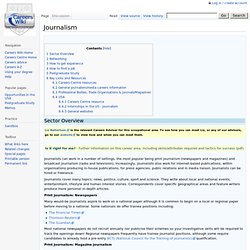
To see how you can meet Liz, or any of our advisers, go to our website to view how and when you can meet them. Journalists can work in a number of settings, the most popular being print journalism (newspapers and magazines) and broadcast journalism (radio and television). Increasingly, journalists also work for internet-based publications, within organisations producing in-house publications, for press agencies, public relations and in media liaison.
Journalists can be hired or freelance. Journalists cover many topics: news, politics, culture, sport and science. How Do You Break Into A Journalism Career. For people who are looking forward to a journalism career, there are so many things that they can do to move an inch higher to their dream.
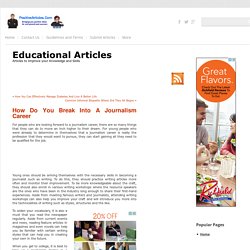
For young people who were already to determine in themselves that a journalism career is really the profession that they would want to pursue, they can start gaining all they need to be qualified for the job. Young ones should be arming themselves with the necessary skills in becoming a journalist such as writing. To do this, they should practice writing articles more often and monitor their improvement.
To be more knowledgeable about the craft, they should also enroll in various writing workshops where the resource speakers are the ones who have been in the industry long enough to share their first-hand experiences. Aside from meeting famous writers and journalists, attending writing workshops can also help you improve your craft and will introduce you more into the technicalities of writing such as styles, structures and the like. How Do You Break Into A Journalism Career.
Y2 HowtoGetaCareerinJournalism. Journalism Jobs : How to Become a Journalist from eHow. Journalism Jobs : How to Become a Journalist eHow Watch Later Added Share Never Stop Learning with Curiosity Keep Watching Replay Video Discover hundreds of thousands of quality videos.
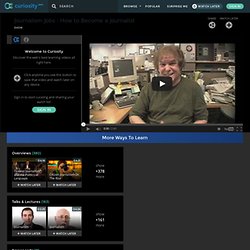
Magazine Journalist Careers and Training Advice for Publishing and Journalism Jobs in the UK. If you are wondering how to become a magazine journalist, below are tips and advice on training for and beginning careers within publishing and journalism, as well as job prospects in the UK.
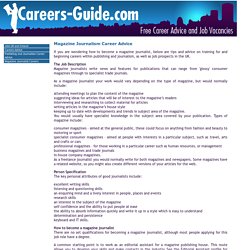
The Job Description Magazine journalists write news and features for publications that can range from 'glossy' consumer magazines through to specialist trade journals. As a magazine journalist your work would vary depending on the type of magazine, but would normally include: attending meetings to plan the content of the magazine suggesting ideas for articles that will be of interest to the magazine’s readers interviewing and researching to collect material for articles writing articles in the magazine’s house style keeping up to date with developments and trends in subject area of the magazine.
You would usually have specialist knowledge in the subject area covered by your publication. Life/ How to write a column/ Stylist - Lucy Mangan. What makes a good column? I feel I should warn you before we set out that if I actually had a foolproof, definitive answer to this question, I would not be writing this article. I would be kicking back with a margarita, served by a lightly-bronzed Jon Hamm lookalike somewhere deep in the Cayman Islands, while my minions bottled, sold and collected the vast streams of profits generated by the international sale of my precious, precious secret.
Nevertheless, there are certain suggestions I can offer, painstakingly gleaned from the six years I have spent as a columnist on the Guardian newspaper, though I again must undermine myself by saying that although I try and adhere to them at all times, I frequently fail and frequently dismally so. Overview of the media and internet sector in the UK. With the move to digital the media sector is in an exciting period of change. Find out who the main employers are and what working conditions you can expect… Newmedialist. The rise of citizen journalism. In a digital world with a whole host of different ways to communicate a factual message it is increasingly hard to judge the value of amateur eyewitness film shot on a mobile phone and posted on the internet against a considered, observational documentary broadcast on a traditional television channel.
From the Occupy New York City bloggers, such as Tim Pool who has broadcast hours and hours of live reports from Zucotti Park in the city, to YouTube videos of citizens under fire from government forces in Syria – these incidents and more are changing the landscape of documentary filmmaking. This has been made possible by the technology they use, the distribution platforms that are now available and the passion of ordinary men and women to tell the kinds of extraordinary stories that were once the domain of professional documentary makers.
Publishing - Creative Industries - Creative Skillset. Open Media for an Open society. Medialex Legal & Business Network. National Council for the Training of Journalists - Home. National Union of Journalists (NUJ) – Winning for you at work. No Contacts? No Problem! - How to pitch and sell a freelance feature. Authors’ Licensing and Collecting Society. CPU Media Trust. Comment, analysis and links covering online journalism and online news, citizen journalism, blogging, vlogging, photoblogging, podcasts, vodcasts, interactive storytelling, publishing, Computer Assisted Reporting, User Generated C. Training by The Press Association. We offer an extensive range of training courses at our training facilities in Central London, Howden in East Yorkshire and Newcastle-upon-Tyne.
Our ability to adapt our training courses to match the dramatic changes that are taking place in our industry is crucial to producing the next experts in their field. Whether you work in journalism, the media, general communications or public relations, the industry is constantly evolving driven by the impact of social media.
By receiving the correct training, participants will stay ahead of digital technology, video, migration of audience to the web and mobile and tablet apps – vital in this increasingly competitive workplace.